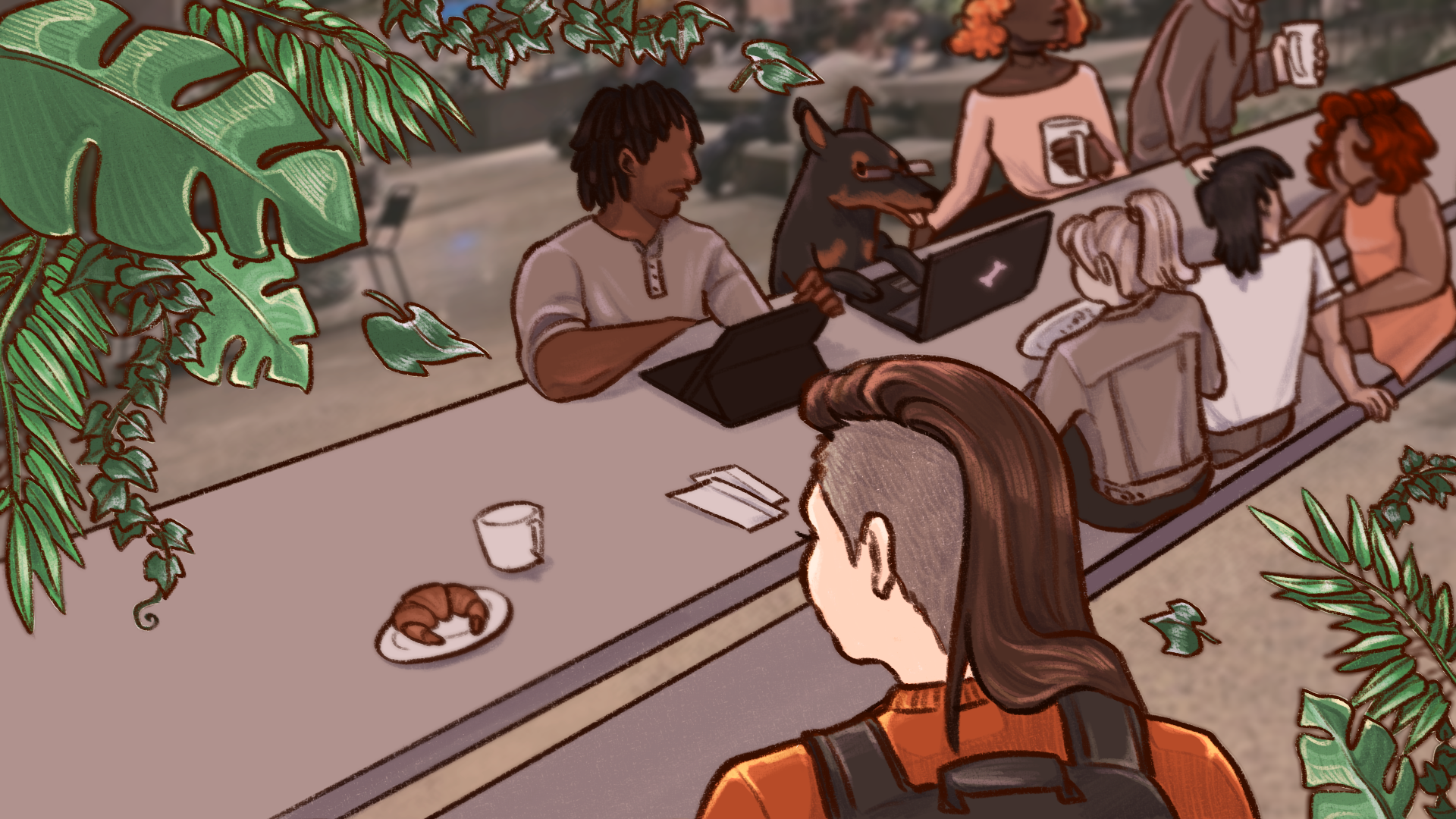It’s a brisk March evening in the East Village, when a 19-year-old Parsons student receives a text and is asked to meet for a date. She accepts and begins her typical pre-date ritual: She picks out a short and simple black dress, blends out her neutral eyeshadow, straps on her favorite brown Dolce Vita wedges and she’s ready to go. She feels a little nervous, but that’s normal before a date, right?
She hops in an Uber heading towards the Upper East Side. The Uber was sent by her date, a man in his late 30s who works in finance. At the end of the night, she will leave with an extra $1,000 in her pocket.
“It’s not as scary as it sounds. You’d be surprised how normal the people you meet on the app are. But I also could see how many people wouldn’t feel comfortable doing this type of thing,” she said.
This Parsons student’s date night is an increasingly common occurrence among students at The New School and universities nationwide. She found this engagement through SeekingArrangement. SeekingArrangement is an American sugar baby and sugar daddy dating website founded by MIT graduate Brandon Wade in 2006.
In the arrangement, wealthy men, commonly called “sugar daddies,” lavish their dates, sugar babies, with gifts and/or money.
According to SeekingArrangement, more than three million American students registered on the site in 2017, often in order to find relief from tuition or other college-related costs. SeekingArrangement advertises their services with the line, “Finding the right sugar daddy can help a sugar baby stay ahead of the game and get the education they need without student loan debt.”
While its website markets the product towards college students looking to fund tuition and school-related expenses, that’s not always the case for some students at The New School.
There are 363 New School Students registered on SeekingArrangement. According to Josette D’Espyne, SeekingArrangement’s public relations coordinator, 94 New School students joined the app in 2017, a 29 percent increase from 2016. 74 students joined in 2016.
These numbers only account for students who used their university emails to register. None of the five students interviewed by The New School Free Press felt comfortable signing up for an account using their school emails.
The students interviewed use the app in different ways. The majority use it to find men who are interested in forming consistent arrangements, where the men expect to have sex. However, there are the students who are only looking for platonic arrangements, where sexual acts aren’t involved, but money still is.
“There’s the culture at Parsons where high fashion and having new clothes is expected. It’s just part of the deal. People want to have new stuff all the time and not everyone can afford that type of lifestyle,” said the Parsons student, who asked to remain anonymous to protect her identity. “Students want a way to be able to afford it. Once some people started using the app, it became known that it’s a way that works for people.”
The Parsons student began using the app when she moved to New York and first lived on her own. She needed a job that was flexible enough to fit her school schedule. “When I found out about SeekingArrangements it was like I could make money on my own terms, on my own hours, and still be able to have time for school.”
“I think sugar babying has a very specific appeal as opposed to camming or regular escorting or the other services in sex work. I don’t think the other services have the same fame feel to it, the same glamorous appeal,” said Siobhan Dougherty, 19, an anthropology major at Lang.
Dougherty found out about SeekingArrangement while working as a cam girl online. Camming usually involves performing on a webcam for anonymous viewers who request sexual activities, usually solo, for tips and by-minute charges, she said.
For some, platonic relations are possible, but for others they’re a rare occurrence. Students often will join SeekingArrangement thinking that they will be paid to do something simple, like have dinner or to keep someone company. However, when they make their account and start to see the profiles of the men, the reality of SeekingArrangement is revealed.
“The guys were really demanding, and straightforward. They don’t play around. They tell you exactly what they want and what they have to offer, including their net worth,” said Jamiya Leach, a first year student studying culture and media at Lang. “It’s really weird, because you literally have to market yourself and sell yourself. You have to say your budget, how much you spend in a month. How much you’d like to get from these guys. So I felt really uncomfortable.” Leach made an account out of curiosity, but never ended up meeting with anyone.
Another 19-year-old Parsons student, who studies fashion and wanted to withhold her name, joined SeekingArrangement in hopes of getting paid just to go on dates. “I still don’t think I’d be able to have sex for money because in the back of my head, I’ll think I’m a prostitute,” she said.
She had a rare first experience with SeekingArrangement. Her date took her shopping on Madison Avenue and bought her an expensive designer gift. She didn’t have to do anything and never saw him again. “I keep on referring to that date as the needle in the haystack. Usually the men are going to expect to have sex in the future,” she said.
The common misconception that SeekingArrangment doesn’t involve sex is infuriating, Dougherty said.
“There’s a ton of us who don’t have the choice to find a random guy to buy us dinner. We actually do end up in arrangements where we do ‘give sugar’ because that’s what the arrangement is and it’s a valid form of sex work,” Dougherty said.
It’s the large amounts of money the app is known for that attracts the students. The pay for the Parsons student who wore the Dolce Vita wedges ranges from $400 to $1,000 per date, which usually last an hour to an hour and a half.
“Normally I’ve averaged around keeping my bank account in the $4,000 range,” she said. “Then I keep spending while trying to keep that much in the bank. It goes up and down. I’ll make a big purchase like an expensive dress or handbag, but then I’ll make a ton of money to make up for it.”
Dougherty said she made around the same as the Parsons student through SeekingArrangement. However, her compensation from the other forms of sex work was much lower. Through SeekingArrangement, “I got paid $500 for half an hour’s worth of ‘work.’ Whereas on a normal basis, it’s very tip based and very scattered,” she said.
Rachel Pallone, 34, started working as a sugar baby when she was just 15, usually meeting men during her Miami waitressing jobs at Nikki Beach and Opium Garden, she said.
“The strangest way I met one was I rear-ended a Lexus LS in 2003. The driver ended up taking me to lunch and then proceeded to give me money throughout college,” Pallone said.
The lavish gifts these men gave her initially made her feel powerful, but that gradually slipped away, she said.
“With every designer bag and pair of shoes I lost the self confidence that I could buy this or give this to myself. I had so much guilt and shame,” Pallone said.
Pallone’s perception of men was damaged after her work as a sugar baby. She was unable to interact with a man without looking at the encounter as a business transaction, she said.
At 28, Pallone decided her sugar baby status was more damaging than rewarding. Later on, she took a job working for an anti-sex trafficking organization, Selah Freedom. Selah Freedom, which is based in Florida, provides education on the issue of sex trafficking throughout the country, as well as teen prevention, outreach and safe housing. “It has affected my life today by being a way that I help other women,” Pallone said. Pallone received her MBA in 2009 and now works full-time as a nurse.
Increased national attention around sex trafficking has prompted Congress to recently pass two pieces of legislation—Fight Online Sex Trafficking Act and the Stop Enabling Sex Trafficking Act—to stamp out the problem. But their approach targets online forums like Backpage.com and cam sites used by self employed sex workers.
“The reality is the legislation is not made to save people from trafficking. It’s made to shut down employed sex workers, many of whom need this work to survive. We need legislation that protects sex workers and will also lead to less women being trafficked,” Dougherty said. “It makes me scared to lose my option to work again.”
Due to the fact that SeekingArrangment poses itself as a dating and lifestyle website, it will remain unharmed from the enactments of FOSTA and SESTA.
“SeekingArrangement always has been on the forefront against sexual abuse and sex trafficking prevention,” said D’Espyne in an email to the Free Press. “Sexual arrangements are not allowed or promoted on SeekingArrangement.”
Meanwhile, young women at The New School will continue to use its service, braving the unknown.
“I’m not really into meeting with people once, because that just feels so transactional that it almost makes me feel sick about it. If you’re seeing someone regularly, you can count on them,” the Parsons student said. “You have to put a lot on the line before you meet someone. Who can you trust? You have to find someone who wants the same thing as you, so it’s harder,” she said.
Illustration by Ashlie Juarbe
Sammi Fisher is the former Editor-in-Cheif & Senior Editor of the New School Free Press. Prior, she spent a year as the Arts & Culture Editor.







